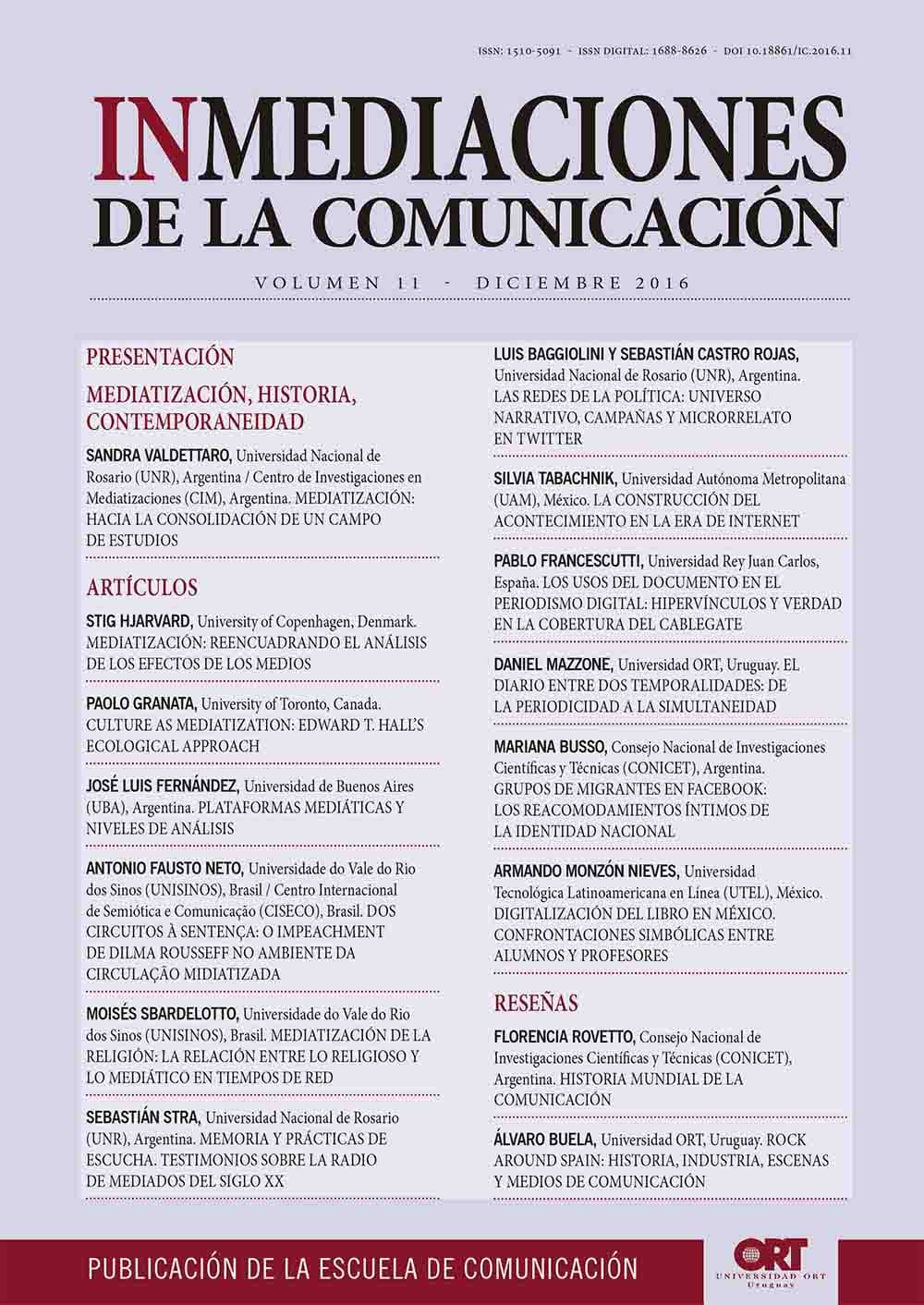La cultura como mediatización: el enfoque ecológico de Edward T. Hall
DOI:
https://doi.org/10.18861/ic.2016.11.11.2627Palabras clave:
Edward T. Hall, relativismo lingüístico, materialismo cultural, comunicación intercultural, ecología culturalResumen
Este artículo pretende presentar una revisión de la investigación etnográfica y antropológica de Edward T. Hall con el propósito de considerar críticamente la mediatización como un proceso cultural complejo. Esto implica el soporte explícito del relativismo lingüístico y el materialismo cultural. La creencia de Hall en el relativismo lingüístico lo llevó a investigar más a fondo los procesos de comunicación sobre la base de un estudio que resultó directamente de la investigación antropológica conducida por Sapir y Whorf en línea con la tradición de Boas. Hall se dio cuenta de que los principios definidos en relación con el estudio de las lenguas y la comunicación interpersonal podrían aplicarse con resultados igualmente buenos al estudio del comportamiento humano en general o de la totalidad de los hechos culturales y de la cultura.
Además, desarrolla su concepto de cultura desde una perspectiva estrictamente ecológica o la idea de que resulta de la conexión especial entre el hombre y su entorno. El enfoque de Hall combina y mezcla dentro de una visión sistémica de la cultura tanto el materialismo cultural defendido por Harris y White, como la tradición cognitivista fundada por Boas.
Este artículo muestra la esencia del enfoque ecológico de Hall, según el cual la cultura se concibe como un todo: un sistema dinámico, un proceso coherente de mediatización dentro del cual todos los elementos están profundamente conectados y, por tanto, resultan co-dependientes.
(Artículo completo en idioma inglés).
Descargas
Citas
Bennett, M. J. (1998). Basic concepts of intercultural communication: Selected readings. Boston: Intercultural Press.
Birdwhistell, R. L. (1952). Introduction to Kinesics. An Annotation System for Analysis of Body Motion and Gesture. Louisville, United States: University of Louisville Press.
Boas, F. [1911] (1938). The mind of primitive man. New York: The Macmillan Company.
Borofsky, R. (1994). Assessing cultural anthropology. New York: McGraw-Hill.
Brake, T., Walker, D. & Walker, T. (1995). Doing Business Internationally. Burr Ridge, United States: Irwin.
Cuche, D. (1996). La notion de culture dans les sciences sociales. Paris: Editions La Découverte.
Flayhan, D. (2002). Hidden Dimensions of Hall in Media Ecology. In Proceedings of the Media Ecology Association, 3, pp. 1-20.
Gadamer, H.-G. [1960] (1975). Truth and method. New York: Seabury Press.
Hall, E. T. (1959). The silent language. Garden City, United States: Doubleday.
Gadamer, H.-G. (1966). The hidden dimension. Garden City, United States: Doubleday.
Gadamer, H.-G. (1976). Beyond Culture. Garden City, United States: Doubleday.
Gadamer, H.-G. (1983), The Dance of Life. The Other Dimension of Time. Garden City, United States: Doubleday.
Gadamer, H.-G. (1992). An anthropology of everyday life: An autobiography. Garden City, United States: Doubleday.
Harris, M. (1968). The rise of anthropological theory: A history of theories of culture. New York, United States: Crowell.
Kaplan, D. & Manners, R.A. (1972). Culture Theory. Englewood Cliffs, United States: Prentice Hall.
Katan D. (1999). Translating Cultures. New York: Routledge.
Kroeber, A. L. (1952). The nature of culture. Chicago, United States: University of Chicago Press.
Leeds-Hurwitz, W. (1990). Notes in the History of Intercultural Communication. In Quarterly Journal of Speech, 76 (3), pp. 262-281.
Lyons, J. (1981). Language and linguistics: An introduction. Cambridge, RU: Cambridge University Press.
McLuhan, M. (1962). The Gutenberg galaxy: The making of typographic man. Toronto, Canada: University of Toronto Press.
McLuhan, M. [1964] (1994). Understanding media: The extensions of man. Cambridge, RU: The MIT Press.
Molinaro, M., McLuhan, C. & Toye, W. (1987). Letters of Marshall McLuhan. Toronto: Oxford University Press.
Moore, J. D. (2012). Visions of Culture. An Introduction to Anthropological Theories and Theorists. Lanham, United States: Altamira Press.
Ong, W. J. (1982). Orality and literacy: The technologizing of the word. London: Methuen.
Peace, W. (2004). Leslie A. White. Evolution and Revolution in Anthropology. Lincoln, United States: University of Nebraska Press.
Rogers, E. M. (2000). The Extensions of Men. The Correspondence of Marshall McLuhan and Edward T. Hall. In Mass Communication and Society, 3 (1), pp. 117-135.
Rogers, E.M., Hart W.B. & Miike, Y. (2002). Edward T. Hall and The History of Intercultural Communication. In Keio Communication Review, 24, pp.3-26.
Sapir, E. [1921] (1949). Language: An introduction to the study of speech. New York: Harcourt, Brace & Co.
Steward, J. H. (1955). Theory of culture change: The methodology of multilinear evolution. Urbana, United States: University of Illinois Press.
Tylor, E. B. [1871] (1970). The origins of culture. Gloucester, England: P. Smith.
Veblen, T. [1899] (2004). Theory of the leisure class. London: Routledge/Thoemmes.
White, L. A. (1949). The science of culture: A study of man and civilization. New York: Farrar, Straus.
Whorf, B. L. (1956). Language, thought, and reality: Selected writings. Cambridge, RU: The MIT Press.
Winkin, Y. (1981). La nouvelle communication. Paris: Éditions de Seuil.





